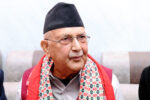KATHMANDU: Foreign affairs experts have emphasized that Nepal should continue maintaining its neutrality viz-a-viz principle of non-alignment.
They have also stressed the need to mold the foreign policy moreover as a sphere of civilian diplomacy while making the use of defense and diplomacy only a rare endeavor at the time of crisis or national emergency.
National security experts, career diplomats, bureaucrats, political analyst, rights advocates and researchers expressed their views at a webinar organized by the Nepal Center for Security Governance (NCSG) ‘Defense Diplomacy in Nepal’s Foreign Policy: Where Do we Stand?’.
In the event moderated by NCSG chairperson Abhaya Raj Joshi, a comprehensive presentation on the topic was made by Dr. Shambhu Ram Simkhada, former Ambassador saying Nepal’s relations with China and India had their share of ups and downs.
He explained why Nepal is not a small country because we are small but because we lie between the two giant countries.
Highlighting the complexity of Nepal’s current foreign policy he stressed on the need for review with new agendas, balancing the role of defense and diplomacy in national security, and comprehending the changing trends and priorities in the current international relation.
Dr. Simkhada added that Nepal stand at the third wave that ripples beyond the trans-Himalayas and that is why we need to be able to navigate through the uncertain Asia in a risky world and manage the unintended changes.
He also stressed the need that Nepal has to continue with its nonalignment, maintain neutrality with enhanced capacity, develop alliance and use defense diplomacy only for harmonized national interest within regional/global collective security, prosperity and dignity.
National security experts were found concerned about the regional hegemony by India and China who are emerging economic and military superpowers.
Nepal’s foreign policy need to be smart in dealing with them as is also important from national security perspective, they claimed that global geopolitics along with its internal affairs is reshaping Nepal’s dynamics.
Rights activists also explained how military has played important role during the time of crisis in the country.
They stressed on the need that military diplomacy could be developed as an important part of civilian diplomacy.
Some security experts claimed that, in Nepal, stakeholders have the divided mindset about the national priority issues.
Therefore, it is important to screen the functioning of every stakeholders including the civil bureaucracy.
In fact, bureaucracy plays important role in setting the foreign policy of the country, so it is important to evaluate the performance of our ambassadors and senior public officials.
They further said that despite different mindset, bureaucracy and civilian diplomacy should be prioritized in foreign policy sphere, and if somehow defense diplomacy becomes unavoidable we have to set standards in prior- what will be their departure line.
Talking on the issues of Nepal-India relation, some political analyst said that both the states need to be open what we are trying to achieve and should seek political or diplomatic solutions rather than using military diplomacy time and again.
Otherwise, Nepal, given its imbalance in military strength, in a long run it has less potential to use its military as a hard power to pursue its national interests, they said.









Comment